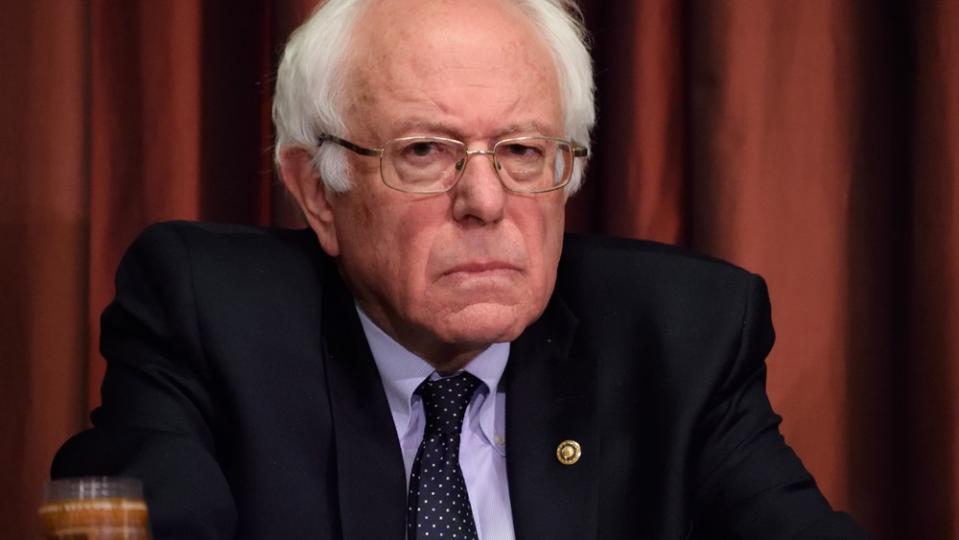Bernie Sanders Pushes For A '32-Hour Workweek With No Loss In Pay,' But Who Will Pay You For Those 'Free' 8 Hours?

U.S. Sen. Bernie Sanders (I-Vermont), known for his progressive stance and two bids for the Democratic presidential nomination, has put forward a groundbreaking proposal aimed at overhauling the American workweek.
His proposal raises the pressing question: In a future where technology amplifies efficiency, who shoulders the cost of this "free" time?
Don't Miss:
The average American couple has saved this much money for retirement — How do you compare?
For many first-time buyers, a house is about 3 to 5 times your household annual income – Are you making enough?
The bill he introduced seeks to transition the United States to a four-day workweek, or 32 hours, without a reduction in worker pay. Amid a backdrop of rising concerns over worker well-being and economic inequality, Sanders's initiative represents a bold reimagining of labor norms.
“Moving to a 32-hour workweek with no loss in pay is not radical," Sanders said. "What’s radical is that over $50 trillion in wealth has been redistributed from the bottom 90% to the top 1% over the past 50 years. It’s time that the financial gains from new technology benefit workers, not the 1%.”
This statement underscores a critical reassessment of productivity gains and wealth distribution in the era of technological advancement.
The push for a shortened workweek is backed by evidence suggesting it could lead to increased productivity and overall happiness among workers. Yet, the bill faces significant legislative hurdles, with a divided Congress where Republicans hold the House majority and a narrow Democratic edge in the Senate.
"Today, American workers are over 400% more productive than they were in the 1940s," Sanders said. "And yet millions of Americans are working longer hours for lower wages than they were decades ago. That has got to change."
His vision encompasses a broader benefit from technological advances, aiming to ensure that the windfalls from artificial intelligence, automation and new tech enrich the working class rather than a select few on Wall Street.
Trending: Can you guess how many Americans successfully retire with $1,000,000 saved? The percentage may shock you.
The introduction of such transformative legislation has raised questions and concerns about its economic implications. The question of who will bear the costs, specifically regarding maintaining wages for reduced hours, points toward businesses as the responsible entities. The legislation requires employers to pay overtime for hours worked beyond the standard 32-hour threshold. It ensures workers’ pay and benefits are protected, implying that businesses would need to adjust to cover these costs without reducing employee compensation.
Critics worry about the potential impact on small businesses, restaurants and the trades, suggesting that such a shift could lead to higher operational costs and possibly force businesses to outsource jobs to lower-cost labor markets.
There’s also speculation on how this change could disrupt the balance that has maintained the United States as a prosperous nation. Opponents argue that the bill, while well-intentioned in aiming to improve workers’ quality of life, could inadvertently harm the fabric of the American economy, affecting competitiveness and job creation.
These concerns point to a broader conversation about the role of work in society and the distribution of economic gains. As the bill garners support from various unions and campaign groups, and with historical precedents for reducing work hours, the debate is set to intensify.
Proponents like Sanders argue that now is the time for a bold reevaluation of work standards to ensure that technological advancements lead to tangible benefits for all workers, not just a select few.
Read Next:
For many first-time buyers, a house is about 3 to 5 times your household annual income – Are you making enough?
Can living off interest from a $1 million investment support my retirement dreams?
Send To MSN: Send to MSN
"ACTIVE INVESTORS' SECRET WEAPON" Supercharge Your Stock Market Game with the #1 "news & everything else" trading tool: Benzinga Pro - Click here to start Your 14-Day Trial Now!
Get the latest stock analysis from Benzinga?
This article Bernie Sanders Pushes For A '32-Hour Workweek With No Loss In Pay,' But Who Will Pay You For Those 'Free' 8 Hours? originally appeared on Benzinga.com
© 2024 Benzinga.com. Benzinga does not provide investment advice. All rights reserved.

 Yahoo Finance
Yahoo Finance 